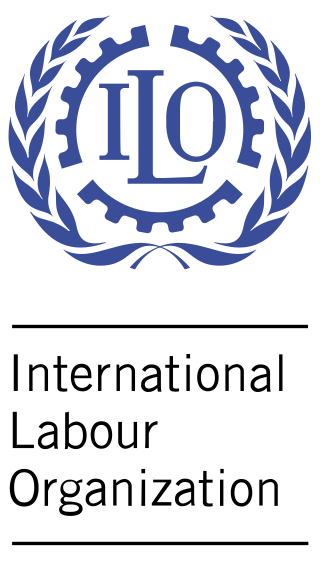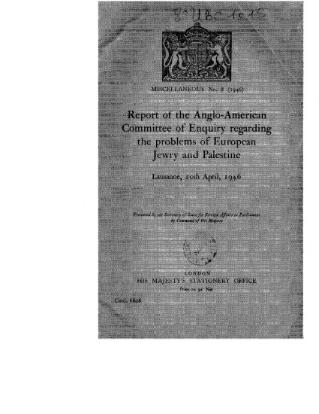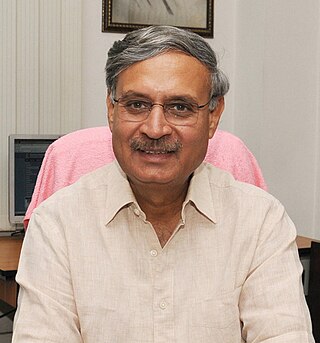
The International Telecommunication Union (ITU) is a specialized agency of the United Nations responsible for many matters related to information and communication technologies. It was established on 17 May 1865 as the International Telegraph Union, significantly predating the UN and making it the oldest UN agency. Doreen Bogdan-Martin is the Secretary-General of ITU, the first woman to serve as its head.

The International Labour Organization (ILO) is a United Nations agency whose mandate is to advance social and economic justice by setting international labour standards. Founded in October 1919 under the League of Nations, it is one of the first and oldest specialized agencies of the UN. The ILO has 187 member states: 186 out of 193 UN member states plus the Cook Islands. It is headquartered in Geneva, Switzerland, with around 40 field offices around the world, and employs some 3,381 staff across 107 nations, of whom 1,698 work in technical cooperation programmes and projects.

The Organization of American States is an international organization founded on 30 April 1948 to promote cooperation among its member states within the Americas.

The United Nations Industrial Development Organization (UNIDO) is a specialized agency of the United Nations that assists countries in economic and industrial development. It is headquartered at the UN Office in Vienna, Austria, with a permanent presence in over 60 countries. As of October 4,2024, UNIDO comprises 173 member states, which together set the organization's policies, programs, and principles through the biannual General Conference.

The United Nations Secretariat is one of the six principal organs of the United Nations (UN), The secretariat is the UN's executive arm. The secretariat has an important role in setting the agenda for the deliberative and decision-making bodies of the UN, and the implementation of the decision of these bodies. The secretary-general, who is appointed by the General Assembly, is the head of the secretariat.

The United Nations System consists of the United Nations' six principal bodies, the Specialized Agencies and related organizations. The UN System includes subsidiary bodies such as the separately administered funds and programmes, research and training institutes, and other subsidiary entities. Some of these organizations predate the founding of the United Nations in 1945 and were inherited after the dissolution of the League of Nations.

The American Conference of Governmental Industrial Hygienists (ACGIH) is a professional association of industrial hygienists and practitioners of related professions, with headquarters in Cincinnati, Ohio. One of its goals is to advance worker protection by providing timely, objective, scientific information to occupational and environmental health professionals.

The Anglo-American Committee of Inquiry was a joint British and American committee assembled in Washington, D.C., on 4 January 1946. The committee was tasked to examine political, economic and social conditions in Mandatory Palestine and the well-being of the peoples now living there; to consult representatives of Arabs and Jews, and to make other recommendations 'as may be necessary' to for ad interim handling of these problems as well as for their permanent solution. The report, entitled "Report of the Anglo-American Committee of Enquiry Regarding the Problems of European Jewry and Palestine", was published in Lausanne, Switzerland on 20 April 1946.

The Government Secretariat is the collective administrative headquarters of the Government of Hong Kong. It is collectively formed by the offices of the Chief Secretary and of the Financial Secretary as well as thirteen policy bureaux.

Albert Thomas was a prominent French Socialist and the first Minister of Armament for the French Third Republic during World War I. Following the Treaty of Versailles, he was nominated as the first Director General of the International Labour Office, a position he held until his death in 1932. As Director-General, he was succeeded by Harold Butler.

The Ministry of Statistics and Programme Implementation (MoSPI) is a ministry of the Government of the Republic of India concerned with coverage and quality aspects of statistics released. The surveys conducted by the Ministry are based on scientific sampling methods.
United Nations General Assembly Resolution 30/3520 (XXX.) was a resolution adopted by the UN General Assembly on 15 December 1975. The resolution adopted the World Plan of Action and related resolutions from the International Women's Year World Conference on Women which was held in Mexico City earlier in the year.

Pan-American Conference of Women occurred in Baltimore, Maryland in 1922. It was held in connection with the third annual convention of the National League of Women Voters in Baltimore on April 20 to 29, 1922. Cooperating with the League in bringing the Pan American Women's conference to the United States were the US Secretary of State, Charles Evans Hughes, the US Secretary of Commerce, Herbert Hoover, and Dr. Leo Stanton Rowe, Director General of the Pan American Union (PAU). The conference was meant to strengthen and carry a step forward the initiative undertaken at the Second Pan American Scientific Congress, when a woman's auxiliary committee was formed to develop closer cooperation between the women of the American continent.
The Primer Congreso Interamericano de Mujeres was a feminist meeting held from 21 to 27 August 1947 in Guatemala City, Guatemala. It was called together by the Women's International League for Peace and Freedom (WILPF) and hosted by the Unión Democrática de Mujeres of Guatemala. This organization had been formed by Angelina Acuña de Castañeda, Berta Corleto, Elisa Hall de Asturias, Gloria Menéndez Mina de Padilla, Rosa de Mora, Irene de Peyré, and Graciela Quan immediately following the Guatemalan 1944 coup d'état to push for recognition of women's civil rights.

The Inter-American Commission of Women, abbreviated CIM, is an organization that falls within the Organization of American States. It was established in 1928 by the Sixth Pan-American Conference and is composed of one female representative from each Republic in the Union. In 1938, the CIM was made a permanent organization, with the goal of studying and addressing women's issues in the Americas.
The Eighth Conference of the International Woman Suffrage Alliance occurred June 6–12, 1920, in Geneva, Switzerland.
The Women's suffrage movement in India fought for Indian women's right to political enfranchisement in Colonial India under British rule. Beyond suffrage, the movement was fighting for women's right to stand for and hold office during the colonial era. In 1918, when Britain granted limited suffrage to women property holders, the law did not apply to British citizens in other parts of the Empire. Despite petitions presented by women and men to the British commissions sent to evaluate Indian voting regulations, women's demands were ignored in the Montagu–Chelmsford Reforms. In 1919, impassioned pleas and reports indicating support for women to have the vote were presented by suffragists to the India Office and before the Joint Select Committee of the House of Lords and Commons, who were meeting to finalize the electoral regulation reforms of the Southborough Franchise Committee. Though they were not granted voting rights, nor the right to stand in elections, the Government of India Act 1919 allowed Provincial Councils to determine if women could vote, provided they met stringent property, income, or educational levels.
The New Zealand Women Teachers' Association (NZWTA) was an advocacy group for the rights of teachers that engaged with the Government on a range of issues related to the status, pay scales, working conditions and opportunities for women teachers in the country from 1914 to 1964. Beginning as a number of regional organisations that had begun lobbying the New Zealand Government on education issues from 1901, by 1915 NZWTA was a national organisation with a constitution and elected committee that ran annual conferences and presented remits to the Government on behalf of the regions. The association was affiliated with the National Council of Women (NCW), worked with the New Zealand Educational Institute (NZEI) and was a member of the Pan Pacific and Southeast Asia Women's Association which led later to the establishment of the Pan-Pacific Women's Association in 1930.

Pan-Pacific Union was an American organization founded in 1912 in Honolulu, Hawaii by Alexander Hume Ford. It was directed by men of every nation about the Pacific Ocean for the purpose of bringing the countries into close and more friendly relationship and understanding. A part of the Samuel Northrup Castle property in the Mānoa Valley became the headquarters of the Pan-Pacific Union.

The First Pan Pacific Conference on Education, Rehabilitation, Reclamation and Recreation was held in Honolulu, Territory of Hawaii from April 11 to 16, 1927. Convened by President Calvin Coolidge, it was the first official conference held in Honolulu called by the head of a Pacific government. The conference was designed for the consideration of problems relating to Education, Rehabilitation, Reclamation and Recreation. Invited delegates hailed from all countries bordering on the Pacific Ocean. It was the first time that Hawaii held a conference of this size. Conference headquarters were at the Royal Hawaiian Hotel.
















